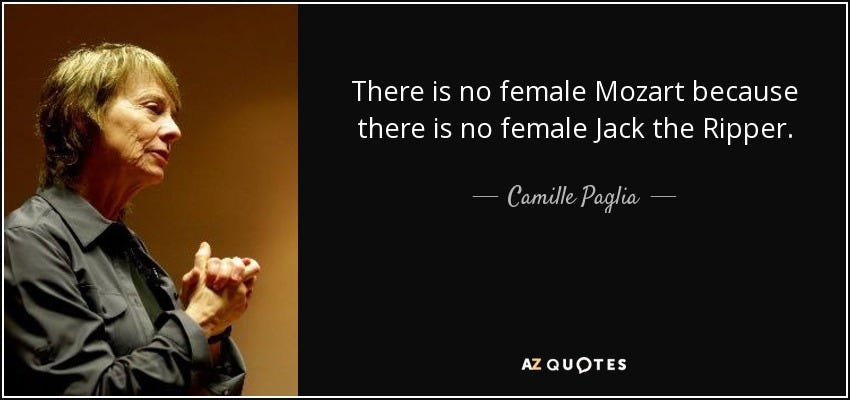Teslo describes herself as a former "cultural incel":
“Not long ago, I was a staunch materialist, convinced that scientific and technological advances were the ONLY drivers of civilisation, relegating Culture to a mere sideshow for those less mathematically inclined. My relationship with Culture was like that of a man ensnared by a beguiling woman; I despised my own susceptibility to her allure, resenting the control she wielded over me, yet I couldn't help but steal glances at her. Despite my attempts to dismiss her, Culture, much like the woman, spurned me, leaving me in a state of denial and reluctant fascination. [..] As with all Incels, My Inceldom was born out of cope for feeling spurned by the object of my desire. The way in which Culture rejected me is that it didn't seem to reflect my identity or beliefs.”1
Her point has some validity. I have met people with high mathematical intelligence, high social conservatism, and low verbal intelligence who just didn’t “get” culture. They didn’t get art, didn’t get theater, didn’t get Shakespeare, it all seemed useless and irrelevant to them.
While they were doing calculus, I studied Shakespeare. While they were engaged in scientific research, I read the Aeneid in the original Latin. While they spent months getting a PhD in genomics for the sake of professionalism, I wrote poetry and had a blog. And now, that the fertility rate is low, and the barbarians are at the gate, you have the audacity to come to me for help?
Teslo quotes Israeli historian Joel Mokyr, which would address my argument if more deeply engaged with:
“The willingness to challenge nature [..] is based on metaphysical beliefs[.]”
Teslo conflates philosophy and culture, Plato and Trump. Teslo may no longer be a “culture incel,” but is she a “philosophy incel?”
The 12th Century Renaissance
Why did European culture revolutionize in the 12th century? Teslo does not address this question, instead focusing on the 17th century and onward. The emphasis on the 17th century is a shallow, “materialistic” understanding of progress. That is, when technology rears its head most aggressively (in the case of the industrial revolution), this is when we take notice. But underneath the industrial revolution, there is a body of work, philosophy, rather than “a culture of optimism.”
Teslo attributes all European accomplishment to a “spirit of optimism.” This is an infantilized version of the Faustian Spirit. Schopenhauer and Spengler are the cure for this misapprehension. Spengler attributes the birth of the Faustian Spirit to the 10th century. This is when the Christianization of Western and Central Europe was completed, and with this project complete, it set its sights on the entire world. Christianity did not introduce optimism to Europe, but obsession with apocalypse, revelation, and the end of the world. The same spirit would animate Isaac Newton, of the supposedly sunny “Enlightenment,” who was obsessed with calculating the last year before the apocalypse. Very optimistic!
This early period, from the 11th to 12th century, did not result in fantastic inventions by modern standards, although horologia, hourglasses, and early clocks or time-telling devices were introduced. Most people know what an hourglass looks like, but less recognizable is the astrolabe, which I will discuss briefly. But in general, this was not a period of technology. The most dramatic events of this period were religious, bureaucratic, literary, legalistic, dogmatic, and yes, “cultural.” But all of them were rooted deeply in philosophy, without which, culture is a side-show.
Philosophical Revolutionaries
Roscellinus of Compiègne,2 who began his career in 1087, maintained the following:
Only the individual exists;
Universals are merely words.
Such a challenge to the Platonic metaphysics of Christianity was not taken lightly. Roscellinus was threatened by the Council of Soissons with excommunication and stoning for his "tritheistic" beliefs. But like the Biblical critics of the 19th century, he found safety in constant migration, from France to England, England to Rome, Rome to France, and so on.
Peter Abelard, another French philosopher, was born 10 miles from the ancient settlement of Nantes,3 known to the Greeks as a seaport in the tin route which stretched from Ireland to the Middle East. Abelard was, at first, no incel. His student, Heloise, was 21 years younger than him. They began an affair around 1115 when Heloise was only 15, and Abelard was 36. The couple were a forerunner to Elon Musk and Grimes, at least in their choice of their illegitimate son's name: Astrolabe, the precursor to the sextant, used to chart the stars, altitude, and latitude.
When Heloise’s uncle realized a middle aged man was knocking up his teenage niece and naming their love child after nerd-shit, he decided to cut off Abelard’s balls. At that point, Abelard became a eunuch, one of history’s truecels.
Concerning the astrolabe as a scientific instrument, its use and function was described in the treatise De opere astrolapsus, likely written in 1149 or 1150.4 The author, Adelard of Bath, was an extraordinary Anglo-Saxon natural philosopher born in the southwest of England. Adelard took advantage of the establishment of the Crusader states in 1099 to travel all over Italy, Greece, Spain, Turkey, Syria, and Palestine. Because Arabic was the lingua franca of both Spain and Sicily at this time, it is likely that these journeys allowed him to learn that language. He began to translate the works of Arabic mathematics and Arabic philosophy, which was in many cases derived from translations of Greeks.
There is an alternative theory for the mysterious and miraculous creativity and imagination of Adelard. If Adelard had gotten his information from other sources, whether they were pagan, Jewish, or derived from the Cathars, or some other heretical sect, he may have been caught up in the crusading spirit of the 12th century, and excommunicated. But by purporting to “merely translate” Arabic texts, he could use the excuse that these were not his ideas, and he was not in contact with any politically persecuted group, but instead put the blame on an entirely foreign and irrelevant culture. He reduced a potential risk by reformulating his revelations as “cultural eccentricities” and curiosities from another world — almost fiction.
Adelard may have stolen all his ideas from the Arabs (who stole them from the Greeks), or maybe he derived them from his own occult sources, but it could also be a combination of both. In either case, Adelard's study of astronomy and geometry was astounding. His exhortation, De Eodem et Diverso, published as early as 1107, contrasts Philocosmia, the hedonist, with Philosophia, lover of the seven liberal arts. His next tract, Questiones Naturales, published as late as 1133, takes the form of a Platonic dialogue, and espouses the virtue of reason over faith and authority. One of his heretical ideas is that animals have souls, but he tactfully presented this as an “Arabic” idea rather than as his own. Adelard's third treatise, on animal medicine, De Avibus Tractatus, showed his interest in biology.
Philosophy caused Optimism
All science, and all cultural advancement, owes its origin to philosophy. Faustian Philosophy has very little to do with the “optimism of the Enlightenment.” Enlightenment optimism was inspired by the adventures of Marco Polo and Christopher Columbus, the growing military superiority of Europeans, and the possibility of discovering new lands and civilizations. Optimism was a result of discovery, not its cause.
As Paglia put it, “there is no female Mozart, because there is no Jack the Ripper.”
Is a horny, perverted man optimistic about the object of his desire? No. Optimism, that saccharine and sanguine pro-social attitude, is not the source of European brilliance or violence. And yes, brilliance is a kind of violence, because it must always push through the pains of birth to bring something new into the world.5
What was the attitude of the conquistadors? Were they happy-go-lucy optimists? Or, were they psychopaths, murderers, rapists, depressives, moody, grim, evil, sadistic, masochistic, incels, perverts, hedonists, martyrs, suicidal, or all of the above? They were men of extremes, not cutesy optimists. You want culture? Watch Klaus Kinski in Werner Herzog’s Wrath of God.
If you want to understand culture on the deepest level, engage with philosophy. Read Schopenhauer and taste his spirit. That critical spirit is closer to Adelard, Abelard, Roscellinus, and even to Voltaire and Gibbon, than any “cultural optimist.” Calls for optimism are Marxist, in that they propose a deterministic teleology in which things necessarily must get better, and end up in utopia.
What about Nietzsche? Wasn’t he an optimist? Only if you allow your optimism to be defined by the greatest respect for Schopenhauer, the supreme pessimist, and it must be a violent optimism.
What about Jesus? Wasn’t he an optimist? Teslo has something to say about that:
“Jesus and his apostles arguably created one of the most powerful and successful social cohesion technologies: Christianity. Yet they did not go around doing “education campaigns” and explicitly telling people how to turn the other cheek with infographics. They inspired their followers with stories; their message was implicit and thus carried more force.”6
Where does Christianity come from? Did it pop up out of the aether? No. Christianity resulted from the psychological crisis of both Romans and Jews, who were facing a total collapse of traditional authority. No one believed in the Pharisees, because of the contradiction with Hellenism. No one believed in paganism, because of the contradiction with philosophies like Neo-Platonism, Stoicism, and Cynicism.
Christianity arose out of a supreme pessimism, not optimism or “hopeful thinking.” The supposedly “optimism” of Christianity is a rejection of the entire world and a belief that everything is futile without God. We can’t even be good without God! (How is that for optimism?)
The Jews who adopted Christianity literally believed in the end of the world, in their lifetimes. That is the attitude which spawned “one of the most powerful and successful social cohesion technologies.” If you want to re-do that trick, you need to put yourself in the mindset of a self-hating Hellenized Jew. Hail Weininger!
North eastern France, between Paris and Belgium.
North western France.
Barbara Obrist, William of Conches, Māshā'Allāh, and Twelfth-Century Cosmology. 2009, pages 29-87.
Stanislav Grof, liberal pacifist as he is, accurately describes the relationship between sex, violence, and the Eurocentric “Newtonian-Cartesian” metaphysics in his work on perinatal psychology — the psychology of birth. This conclusion is already implicit in earlier psychologists such as Nietzsche, Freud, and Jung.







Delightful read
Here’s the female Jack the Ripper:
https://en.wikipedia.org/wiki/Aileen_Wuornos